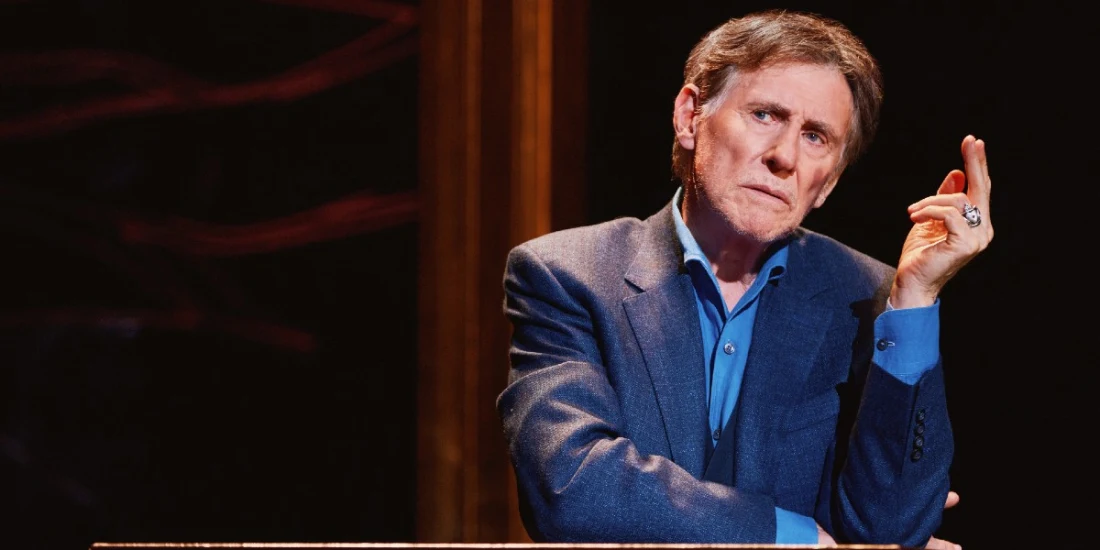'Walking with Ghosts' review — Gabriel Byrne conjures spirits and stories in his earnest solo show
The stage is set for memory lane at Gabriel Byrne’s low-simmering solo show Walking with Ghosts. A series of prosceniums that successively shrink as they recede from the audience simply and efficiently suggest traveling backward.
That’s where the Irish author and actor heads in his adaptation of his 2021 memoir of the same title. Beyond some lighting cues and bits of music, the 2-hour production directed by Lonny Price (Lady Day at Emerson’s Bar & Grill) is essentially a no-frills affair. Its greatest special effect: Byrne himself.
Now 72 with a resume that includes films (The Usual Suspects), TV (In Treatment), and Broadway (A Touch of the Poet), Byrne is an able and appealing yarn-spinner. He summons a few various characters with a deft gesture or vocal shift. His tour of the past begins by recalling a dream that drew him home to Dublin.
Byrne sees his cash-strapped, flea-ridden youthful self as a “ghost boy.” As a kid, he bought a book jammed with 1,000 jokes and memorized them “so that people would like me for making them laugh.” Like the one about two cannibals eating a clown. “Does this taste funny?” one asks.
Flecked with wry humor, Byrne’s stage memoir leans more melancholy than merry. That’s par for the course. The specter of death looms fairly large. Dressed in a casual suit, Byrne takes a chronological path to introduce “ghosts” and their indelible marks on him. They include his working-class mother and father, a barrel maker, his doomed mentally ill sister, a friend who drowned, his grandmother who indulged his love for the cinema – and corn flakes.
It’s a deeply personal story, and there’s not much attempt to put his experiences in a larger context. Each self-contained, bite-sized section ends in a blackout. Connecting the dots between vignettes in a more powerful thematic way would give the show a cumulative wallop that now feels somewhat lacking.
Still, there are standout scenes. One of the best concerns a shopping splurge with his loving mother to buy clothes for his first communion. Money was tight, and his mother paid for the outfit with coins. As a child he was mortified. “I looked away,” Byrne remembers. “I was ashamed I was ashamed.”
At age 11, Byrne went to seminary school, where a predatory priest plied him with wine, put a hand on his knee, and vowed secrecy. “My child’s faith and trust in the world had been destroyed,” says Byrne.
Following that traumatic event, Byrne was adrift. He found work as a plumber, a dishwasher, and a hotel bathroom attendant. “You suspect this job might not be where you were born for,” Byrne observes.
Life changed when he found his way into an amateur acting company, where he at last felt welcome. Scruffy productions of Shakespeare plays became his drama school and eventually led to his life’s work.
Byrne doesn’t dwell on his starry career or his celebrity. He name-drops the late, great Welsh movie star Richard Burton, who he worked with, as a way to explore their shared battles with booze. His revelation that he’s been sober for more than two decades drew applause from the audience.
Byrne concludes Walking with Ghosts with another dream. He’s in an orchard, where he harvests insight that allows the past and the present to peacefully fuse. It’s a tidy bow to tie up an earnest evening.
Photo credit: Gabriel Byrne in Walking with Ghosts. (Photo by Emilio Madrid)
Originally published on
